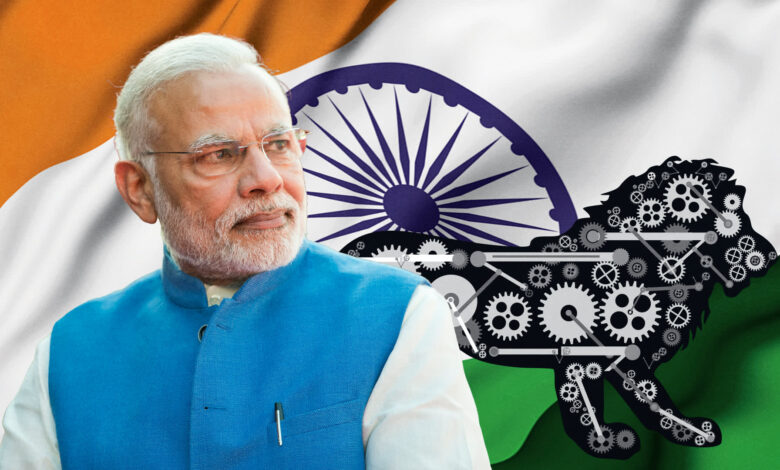Opposition blames Modi’s BJP for high jobless rate

India’s position on the global value chain is shifting due to government incentives and a digitally savvy economy
Getty Premiums
NEW DELHI — As India gears up for the second phase of its general elections, the issue of unemployment is increasingly taking centerstage, with opposition leader Rahul Gandhi charging Prime Minister Narendra Modi and his ruling BJP of making the country “a center of unemployment.”
Joblessness is particularly high among India’s youth — with those aged 15 to 29 making up a staggering 83% of all unemployed people in India, according to the “India Employment Report 2024,” published last month by the International Labour Organisation (ILO) and the Institute of Human Development (IHD).
“Modi has aggravated unemployment in the country. Those able to provide jobs have been devastated due to demonetization and wrong Goods and Services Tax regime,” Gandhi said Saturday at a rally in the eastern state of Bihar in India.
In a move that was widely criticized, Modi announced in 2016, during his first tenure, that 500- and 1,000-rupee notes will be demonetized, or cease to be legal tender.
Demonetization — aimed at curbing black money, or funds earned through illegal activity that avoid taxation — was labeled “monumental mismanagement” by Modi’s predecessor, Manmohan Singh.
However, it did not stop Modi from securing a second term in 2019 with an even stronger mandate.
The country’s unorganized sector has still not recovered from the impact of demonetization, Arun Kumar, economist and a former professor at New Delhi-based Jawahar Lal Nehru university told CNBC, adding it was one of the key reasons for the high unemployment in the country.
India’s unorganized sector, which is made up of millions of small businesses that are privately owned, make up about 93% of the country’s total workforce.
The ILO-IHD findings have been highlighted by the opposition to corner Modi’s ruling Bharatiya Janata Party on the unemployment front, with the president of the Indian National Congress, the country’s main opposition party, calling the country’s joblessness situation a “ticking bomb.”
The issue has found resonance among the voters: A survey earlier this month by the New Delhi-based Centre for the Study of Developing Societies and Lokniti — a research program at CSDS — showed that joblessness was the No. 1 concern among India’s voters.
As many as 32% of the respondents said increasing unemployment was the key reason why they would not elect the BJP again. About 62% of those surveyed said securing employment had become more challenging over the past five years.
The same survey, however, also showed that 44% of the respondents were willing to give the Modi government another chance as opposed to the 39% who did not wish to reelect the incumbent government.
India’s Labour Ministry did not immediately respond to CNBC’s queries pertaining to the country’s unemployment situation.
The shift toward the organized sector from the unorganized sector, and from the labor-intensive industries (such as leather goods and textiles) to capital-intensive sectors (such as e-commerce) has led to the deterioration in India’s jobs generation capacity, Kumar said.
Former Reserve Bank of India governor, Raghuram Rajan, echoed similar concerns last week, pointing to the fall in employment in labor-intensive sectors such as leather goods.
Rajan, who was speaking about how to make India an advanced economy at the George Washington University, said: “Unemployment numbers are high, disguised unemployment is even higher. Labor force participation is low, female labor force participation is really alarmingly low.”
A slowdown in hiring in India’s huge information technology sector is also to blame for the lack of well-paying, white-collar jobs.
Manufacturing puzzle
India’s manufacturing push has so far not been able to address the jobs situation due to limited value-addition and increasing mechanization, Kumar said, citing the mobile phone sector.
“We are assembling the phones here, not manufacturing the parts that would lead to higher job creation. If an Apple phone costs $1,000, we are adding value worth $50-$60, and the jobs being created are commensurate to that value addition,” he told CNBC.
Manufacturing has become capital-intensive and labor-saving. With increasing mechanization, job creation in India has become capital-intensive, with a smaller number of workers employed between 2019 and 2000 than in the 1990s, according to the ILO-IHD report.
“We are going down in those [labor-intensive] areas. No wonder we have more of a job problem,” Rajan said, questioning the government’s priorities “Think about these chip factories. So many billions going to subsidize chip manufacturing.”
The government has been introducing measures such as production-linked incentive schemes to help boost the manufacturing sector, but it has yet to translate into meaningful job creation, amid increasing mechanization, according to economists such as Kumar.
The PLI schemes with an outlay of 1.97 trillion rupees (nearly $24 billion) for five years beginning 2021-22 could potentially create 6 million new jobs, according to the Indian government.
Just a ‘political narrative’?
While the ILO-IHD headline numbers on youth unemployment have become a major talking point this election season, some of the key metrics that point to improving jobs scenario have been lost in the debate.
Youth unemployment, which was at 17.5% in 2019, fell to 12.1% in 2022 and to 10% in 2023, the ILO-IHD report stated. Overall, unemployment fell to 3.1% in 2023 from 3.6% in 2022 and 4.2% in 2021, according to government data.
Former IMF executive director, Surjit Bhalla, also a former member of prime minister’s economic advisory council, told CNBC that a lot of the noise around unemployment is just a “political narrative.”
Even though unemployment is at the front and center of voters’ mind and has been the key issue raised by the opposition parties to put the ruling BJP on the backfoot, a whole host of surveys have shown that Modi will likely win this election with another strong mandate.
If Modi does return to power for the the third term, he will be just the second prime minister to have achieved this feat after Jawaharlal Nehru, the country’s first prime minister.
— CNBC’s Naman Tandon contributed to this story.






